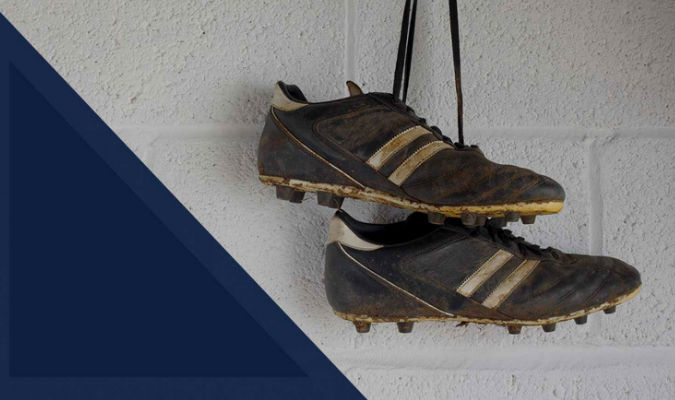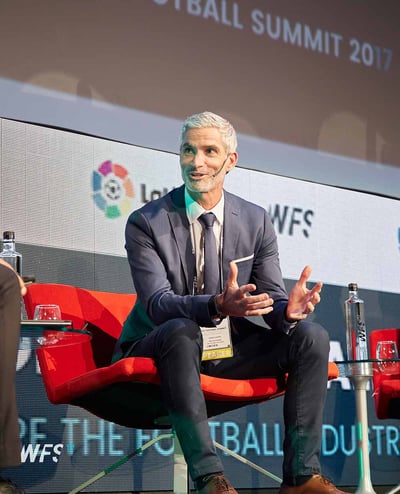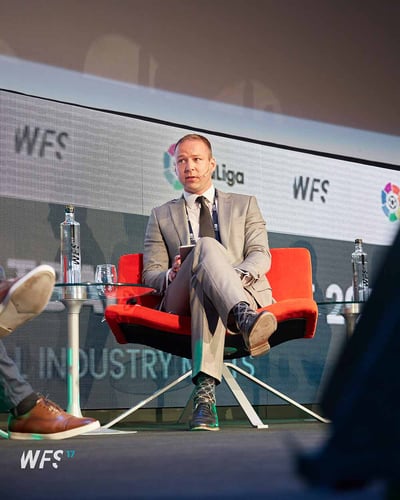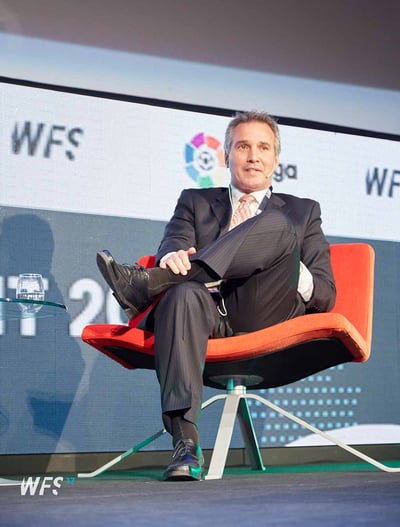Search the latest and greatest job opportunities in sport

Imagine that you have been working exclusively in the same sector for 15 years. You have managed to make a name for yourself, to have the best contacts, to surround yourself with the best work team, you have been a leader, you have been highly valued by colleagues and competitors. And then, suddenly, you have to quit your job. You no longer serve, your contacts do not recognize you, the company for which you gave your all thinks that you are finished, that they can no longer get anything out of your talent or experience. That you have expired. And they have retired you at the age of 40.
Now imagine that you are an athlete. Does it make any sense that those who have dedicated their lives to a sport they are passionate about, and for which they have been a reference and have helped to generate business, should sit on the bench just like any other fan, without being able to contribute all that experience, values and resources so that those who follow them will have a better environment?
There are many who will believe that Johan Cruyff was just a lucky guy because he was born with a gift for playing football. But he also had what it took to get out of a humble environment and become one of the best players in history. And that same rebelliousness made him look around and realize that his ‘people’, those who had chosen the same path in life as him (to devote themselves body and soul to sport), might not have the same determination to retrain when their legs they said enough was enough. Johan continued to lead off the field, as a coach, a manager and a mentor. And he laid the foundations for the sport to stop ‘kicking balls out’ and be nourished by great professionals willing to come down to earth, learn, train and recycle themselves so they can continue giving the best of themselves to the industry that put them on the top in their day.
That was almost 20 years ago and the Johan Cruyff Institute is still committed to sport, athletes and those professionals in the sector who, with the right academic training, want to contribute to making this world not only one of the most productive industries financially, but also one of the most professional.
At the past World Football Summit in Madrid, a reference event in the football industry, the Institute brought together three professionals, all former players, who are now working in offices managing and professionalizing the world of football, after training in our classrooms. Three cases, three different positions and three different continents: Craig Foster , Fernando Revilla and Grétar Steinsson . And we proposed a debate on the subject: Should the football industry be managed by former football players?

Craig Foster, football analyst and ambassador of Johan Cruyff Institute in Australia
“From the position of a former player, it is an interesting topic because people have a common belief that football is based on the players and the fans. Monetization of fans, football marketing, investments in infrastructure, these are all very important issues, but the center of the business always ends up being the players and the fans. And when you launch the debate of what should be the direct involvement of former players in this business, whether in Australia, Europe or America, you seem to always run into a cultural problem,” says Craig Foster , a well-known football analyst and commentator on Australian television, who was also CEO and president of the Professional Footballers Australia (PFA) association and now serves as ambassador for the Johan Cruyff Institute in Australia.
“It’s a cliché to say that the center of the football business is the players and the fans, but the direct involvement of those players in the management of the business is still a cultural problem”. Craig Foster
What would former players contribute to the football business? Craig has it very clear. “Gratitude, specific knowledge of this world, values and contacts (which are basic), respect for the essence of the business (which has been lost in many aspects), and the power of leadership,” he explains. “When we talk about incorporating former players to the management of football, we think about satisfying the needs of those players, but what about the needs of the administration of that business, the good they could do for institutions, clubs and other entities with the proper preparation?”
In this respect, Craig is convinced that “both FIFA and FIFPro have a great responsibility and a huge challenge ahead. They should provide training to active players because they are the center of the whole business, the ones who give it their all, and should have the right to education and opportunities within the clubs.” He believes that “90% of the talent in football is being wasted and that has to change. I don’t want to be misunderstood, but in football millions are spent on recruiting external executives to this world, from outside the sector, instead of on creating our own talent pool so that these professionals stay at the club, transmit their values and position it at the highest level. We’ll all agree that the ideal situation is to employ the best talent in the best positions within football. Players know what that means, they understand it perfectly; they know what competition means. It’s their world! And my argument is that football is not giving its players or former players the opportunity to show that they can also be the best in management. That was Johan Cruyff’s vision, which I totally share”.
“In football, millions are spent on recruiting outside executives instead of creating our own cantera of talent; 90% of the talent in football is being wasted”. Craig Foster
For Craig, it is a cultural problem and he uses his home country as an example to explain this. “In Australia, and elsewhere, there is still that belief among players and, especially among coaches, that it is not necessary to encourage players to study during their sporting career, that they should only be football players, 24 hours a day, and that they should only think about training and playing, when many scientific studies indicate that it is very good to disconnect.”
“Let’s look at the example of the NFL, a competition linked to the university. About 40% of retired players are in the entrepreneurial sector or have their own business. It’s an incredible figure and unthinkable in any other sport. What these former players can contribute to their sport from managerial positions is priceless. And in other sports, that incredible talent is undervalued and totally underutilized.”
According to Craig, they have begun laying the foundation for this to change. “In Australia, we value education very much, and particularly at the PFA, the players’ association. It’s a very recent proposal but one that we are already offering, and it consists of players being able to get training in three areas: doing courses in different online subjects; training as players, to become great professionals and be able to represent our country in the best way possible; and learning how clubs are managed. So, once a week we will give them the opportunity to know, with the help of a mentor, the different functions that a club has at an institutional level, not only in the technical sense. In this way, the best players can be great representatives of the club from other positions because they will have trained to do so. And, those who do not reach the stars, which is the great majority, can work for their club, that they believe in, that they love and that they been a part of for much of their lives.”

Gretar Steinsson, technical director of Fleetwood Town FC
Grétar Steinsson is currently the technical director of Fleetwood Town FC , after playing for, among other clubs, Bolton Wonderers of the English Premier League and the Iceland national team. He comes from a country where education is one of the basic pillars and he was also a special case, what we might call a late footballer. “I became a professional footballer after I had finished my studies, like everyone in Iceland, where education is valued very much,” says Grétar. At the age of 23, he went to play in Switzerland and during his stay there he established a good friendship with “a former player who held the position of sports director”. From there he went to play for the Dutch team AZ Alkmaar , with Van Gaal as manager, and “in those three years I was very interested in taking advantage of the time that I spent with the sports director, the head of transfers, the owner of the club, obviously Van Gaal himself, the marketing people … everything related to the running of the club.”
From Holland, he got transferred to the Premier League, to Bolton Wonders, and his whole environment changed. “It’s a fantastic club, but I only spoke to the CEO twice in five years and with the owner maybe once or twice, and just to say hello and goodbye,” he recalls. “And there, in English football, I realized that, when they fired the coach, everything is a big smokescreen, that there is nothing behind.”
Grétar believes that, as in all debates, there are arguments undeniably in favor and others against. And that, like everything in life, there are those who serve to perform different functions, and there are those who do not. Regarding the arguments in favor of having former players in administrative or management positions, Grétar thinks credibility is indisputably one of them. “You can sit down with players, with agents to negotiate and, immediately, they recognize you as a football person, who has already experienced that situation as a player, who has been on the same stage, or as a manager there are other aspects that you should consider important, and you immediately have a credibility with the person you are speaking to, which, if you were not a former player, would take much longer to have”.
“What players have in their favor is their credibility, they know how to manage pressure and make decisions, they understand the limits, and they have worked from a young age in a professional environment”. Grétar Steinsson
Another inherent quality of athletes is “their ability to adapt to a rollercoaster of emotions constantly, every week, something that is almost impossible to learn if you are not an athlete. It is quite an experience and bringing this to the offices is very important. Living under pressure, knowing how to manage it and make decisions, we are also used to that.”
Understanding the limits and recognizing the experience of all the people in their different positions is another quality of athletes that Grétar values. “From the one who works in scouting, to medical services, to the coach, it is very important to have technical knowledge and be able to understand,” he says. “If you have played for many years, you understand that all players go through stages, you understand the limits. When you have a player who has spread a leg and you are under pressure to find a replacement, being able to sit in an office and know what you need and what you do not need, that is very important.” Being used to being surrounded by and working with great personalities, with professional people, since you were very young, is another point in favor, according to Grétar. “Whether it’s with other players, coaches, agents or medical staff, dealing with professionals when you’re just a teenager and acquiring experience over the years is something you also have to learn.”
And, when it comes to playing the devil’s advocate, Grétar has no problem saying that “players are used to living in a bubble” and some of them like it that way. “They tell you what time you should get up, where to go, how you should dress. We have agents who just take care of everything, the sponsors, etc. We don’t have to do anything. You are really only challenged for 90 minutes, five times a week. And then we expect these people to run the business?” As the English would say, ‘fair enough’.
“Against them, they are used to living in a bubble and only being challenged 90 minutes, five times a week. And we expect these people to run the business just like that, without being educated?”. Grétar Steinsson
The problem, according to Grétar, is that there are many players who do not even want to hear about doing anything other than dedicating themselves to football, or having to make sacrifices to find time for something else, such as their personal development. “The problem of professional training is the lack of education itself. You find very few players you can sit down with and talk about their future, about what will happen when they reach 29, 30, 32 years old. Because this race ends very soon and it happens very fast. Getting them to buy into it is very difficult. Young players believe that they will always succeed, that they will be multi-millionaires and they don’t need to study. But we all know that only a few achieve that and I, as a former player, am concerned that they think like that.”
“Having said that, and as Craig said, there is very little talent in football clubs because nobody cares. In my time at Bolton Wonders, as I said, there was no chance that someone would think of me as someone useful to the club. I was one of those stupid football players who live in a bubble. We are put in that stereotype. The clubs, in reality, don’t care about people, just as the players don’t really care about the institution they are playing for.”
Grétar believes that “it is very important to have football people in the offices, where decisions are made. I think we should be very careful with who they are. That they are not the wrong people. Players need to learn the business, to be given the support to take that step when they are still an elite athlete for when the time comes. All that experience is very valuable”.
“It is very important to have football people in the offices, where decisions are made. Players need to learn because their experience is very valuable”. Grétar Steinsson

Fernando Revilla, president of the Americas Division and member of the executive board of FIFPro
With 10 years of experience as a professional player, Fernando Revilla, currently president of the Americas Division and member of the executive board of FIFPro, general manager of the Peruvian Association of Professional Football Players and a member of the FIFA Players’ Status Committee, contributes a viewpoint from the American continent, where the socio-economic factor is key. A continent in which children and teenagers see football as a way out of economic and social difficulties. “We are exporters of players,” explains Fernando. “And in America we have a very different reality from that of Iceland, which Grétar talked about, because education is not given so much importance and also, public education is not very good. So, in most cases, players are advised to leave school to devote themselves to football. In South America, there are statistics that say that 25-30% of our players have not finished school. And there we have a real problem and that is: what happens tomorrow with all of those people?”
Those who manage to become professionals enter that bubble and in countries where economic inequalities are so acute, giving up that lifestyle is much more complicated. “We have many footballers who finish their career, are used to earning a large amount of money, and do not know what to do with their lives. And the labor market doesn’t give them the value that it gave them as footballers. As footballers, they could be paid a lot of money to play, but if they aren’t prepared for life, the labor market values them very little. That’s where the importance of education comes in,” says Fernando.
“In America, we are exporters of players and here most players are advised to leave school to devote themselves to football. It’s a big problem”. Fernando Revilla
FIFPro America has accepted the challenge of starting to take care of its players. “At present, we have taken on organizing, first, refresher courses so that the boys who did not finish school can finish it,” explains Fernando. “And, from there, for the more educated, there is a bit of everything: technical courses, language courses, coaching courses, courses for those who want to dedicate themselves to sport management, degrees for those who want to go to university. That is what we are trying to promote on the continent, because it is truly a big problem. And not only so they can work within the sector, but also so they can start a new life project, because you’re your professional football career is over, what you ask yourself is: How do I remake my life? Do I stay in the football sector? That would be great, but there probably isn’t work for everyone. Also, some will have saved more money than others, they’ll be able to start a business or enter the world of work, but for that it is very important to have been trained”.
“Many players finish their career and don’t know what to do with their lives. They are used to earning a lot of money, the working world values them very little and in order to start a business it is very important to have training”. Fernando Revilla
Fernando says that “we have detected the problem and we understand that education is a fundamental tool for the future of football players when they finish their sports career.”
In the end, whatever the country, it is about creating opportunities and ending stereotypes. In a highly competitive environment like the sports industry, where so many factors intervene and so much money is invested, there should be no lack of values and education is one of the fundamental values of every society.
And, as our founder Johan Cruyff said, “who better to serve the interests of sport than someone who has the heart of an athlete?”
This article was originally published by our academic partner Johan Cruyff Institute . You can read the original article here .
Give your career a boost with the latest live vacancies in t he sports industry , or create an account today and stay up to date with all the latest industry knowledge, events and jobs in sport.
Search the latest and greatest job opportunities in sport